KATHMANDU: As if challenging the Chinese establishment against all their resources and technology so far, coronavirus contagion has rocked China at a badly impacting decline in tourism, industrial production and most importantly alarming death toll in major trade and economic hubs there.
Alarming epidemic in the form of coronavirus on the one hand and the people’s anger against the government’s attempt to underreport the toll caused by the virus itself has added to the fury of the public.
This disruption comes at a time when Chinese economic growth already looked fragile and will undo some of the boost in consumer and business sentiment from the China-U.S. trade deal.
Though Chinese officials are updating the number of those infected or killed by Wuhan coronavirus regularly, many have questioned the accuracy of the statistics coming from the Communist government.
Some citizens have taken to analyzing screenshots allegedly from China’s biggest tech and media conglomerate Tencent, which may have temporarily displayed the total cases and death rate as much higher than official reports suggest.
While the Communist Chinese government has been frequently criticized for failing to provide transparent information in the past, no news outlet has managed to independently verify if the screenshots were taken from the Tencent website.
According to China’s official data, the epidemic has killed 913 people and infected nearly 40,141 in China.
However, sources claim the toll and the number of people infected to be more than 4 times higher than it’s actually listed in the government record.
“The number of cured cases was only 269, well below the official number that day of 300. Most ominously, the death toll listed was 24,589, vastly higher than the 300 officially listed that day,” the sources said.
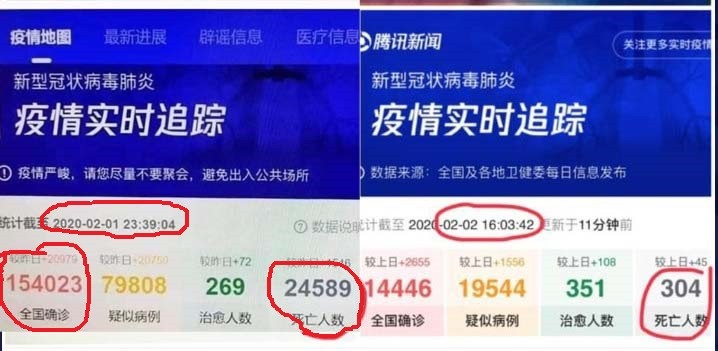
Tencent, on its webpage titled “Epidemic Situation Tracker,” showed confirmed cases of novel coronavirus (2019-nCoV) in China as standing at 154,023 — over 10 times the official figure given to the world on February 1.
According to a Taiwan News report, “Tencent… seems to have inadvertently released what is potentially the actual number of infections and deaths, which were astronomically higher than official figures”.
Once people noticed this, Tencent allegedly updated the numbers to reflect the government’s “official” numbers, according to the report.
“According to multiple sources in Wuhan, many coronavirus patients are unable to receive treatment and die outside of hospitals.”
There have been multiple reports of Wuhan officials cremating deceased coronavirus victims before they could be added to the official death toll. The Wall Street Journal reported that the coronavirus numbers coming out of China are “fishy”.
Caijing, an independent magazine based in Beijing that covers societal, political, and economic issues, has also claimed that the Communist Party of China (CCP) is underreporting the extent of the coronavirus outbreak.
This isn’t the first time China’s openness about a health crisis has been called into question. During the 2003 SARS outbreak, the US State Department used its influence to “increase transparency and response,” from China, according to a 2004 report from the Government Accountability Office.
Furthermore, the report criticized China for its “poor communication within the country, with Hong Kong and Taiwan, and with WHO,” which “obscured the severity of the outbreak during its initial stages.”
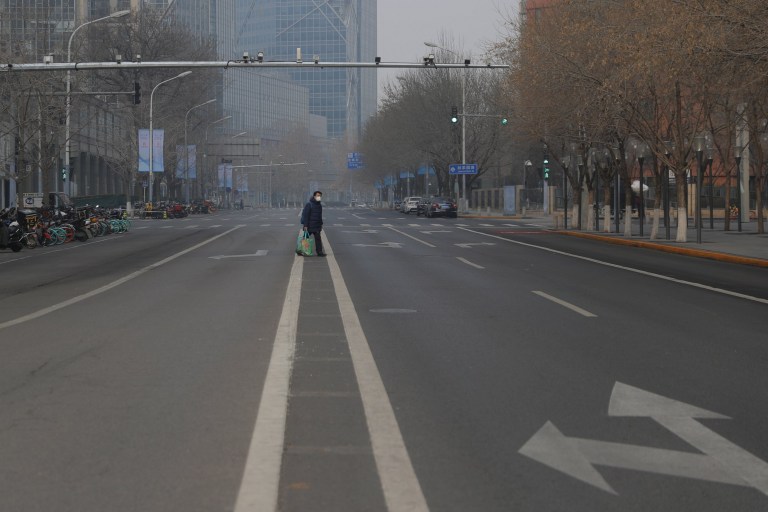
The fact seems to be manipulated cunningly, as the voices of officials in China and the local authority go paradoxically. “We’ve seen no obvious lack of transparency” from China, Executive Director of the WHO Health Emergencies Program Dr. Michael Ryan told reporters Wednesday, according to Newsweek. “Before we start pointing the finger at China, we need to recognize there are genuine sensitivities around sharing data around new diseases.”
On the other hand, the mayor of Wuhan, Zhou Xianwang, said he must have approval from the central government to release disease information, which has contributed to a lack of transparency, as reported last week by the Wall Street Journal.
“As a local government official, after I get this kind of information I still have to wait for authorization before I can release it,” he said during a news broadcast.
“To some degree in the early days of any kind of outbreak like this, there is a fog of war where we just have incomplete information, and it takes time for the information to really unfold,” Gerald Parker, associate dean for Global One Health at Texas A&M, told Politico.
Lo said he did not check the numbers again until he went home that evening when he was shocked to see they had dropped dramatically and “something was wrong.” He said he noticed individuals on a Hong Kong Facebook group also observed the same bizarre occurrence that day.
Similarly, Wuhan has experienced food shortages, an overwhelming number of patients, and several evacuations of foreigners from the city.
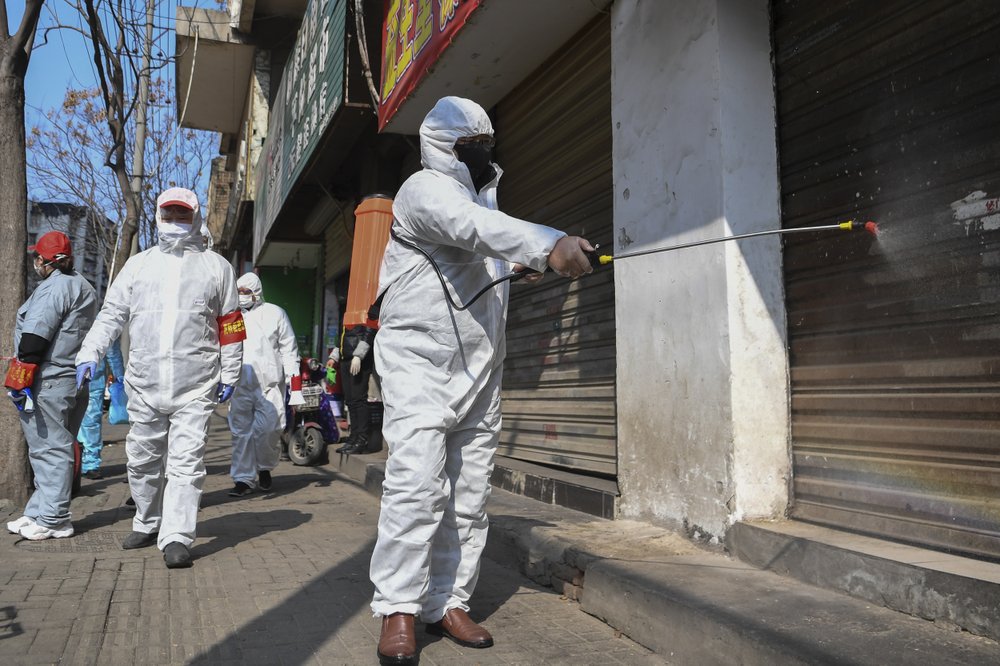
The news about the Nepali victims there also reflects the paradox as what Chinese ambassador to Nepal is found contradicting with the sharing of Nepali victims there.
Although the Chinese Ambassador to Nepal, HouYanqi said, Nepalis who were in the epicenter of Coronavirus are safe, but the Nepalis students there have appealed Nepal’s government to evacuate them at the earliest staying lack of food and water.
Earlier, Chinese Ambassador to Nepal HouYanqiposted a video report prepared by a Chinese media on her Twitter post, saying, “Nepali students in China got interviewed by CMG reporter: we are safe and healthy in Wuhan. Let’s join hands to fight for victory.”
But responding to the Chinese ambassador’s tweet, Ashok, who has identified himself as a student in Wuhan, tweeted: “I am in the same university, but I feel opposite with their comments [sic]. I can say this is totally unfair to publish only positive [sic].”
He ended his Twitter post saying, “We are panicking here.” Like Ashok, many Nepalis in Wuhan are increasingly feeling unsafe and they want the government to do something, according to GaurabPokharel, a medical student in Wuhan. “They are so angry that they have accused the Nepal government of doing nothing in a WhatsApp chat group formed by the Nepali Embassy in Beijing.
A woman from New Zealand, who was in Wuhan to visit her father for the Lunar New Year, told NewsHub that things were tough and scary there.
“It’s quite scary here,” she said. “There are all kinds of rumors online and there’s a shortage of medical supplies. If we go outside, we cannot buy masks anywhere. “There’s also a shortage of food,” she added. “A lot of shelves are empty.”
A video shows medical staff apparently in Wuhan saying there was no more food or drink left in the hospitals and asking for more provisions to be sent to the city.
likely a video from a hospital in #WuhanLockDown
medics are saying there is no food in hospital now.
we need food, we need food.#WuhanCoronavirus #coronavirus pic.twitter.com/nYukTdqbZT— 巴丢草 Badiucao (@badiucao) January 29, 2020
Moreover, the ruling Communist Party faced anger and recriminations from the public over the death of a doctor who was threatened by police after trying to sound the alarm about the disease over a month ago. The government announced that another 3,399 people had been diagnosed over the last 24 hours, reversing two days of declines, and raising the total accumulated number of cases on the mainland to 34,546.
Public anger continued to simmer over the authorities’ treatment of a young doctor who was reprimanded by police for issuing a warning about the virus before being infected and dying this week.
The death of 34-year-old Li Wenliang, the whistle-blower against coronavirus, became the face of anger at the ruling Communist Party’s control over information. The people have started to complain that officials lie about or hide disease outbreaks, chemical spills, dangerous consumer products or financial frauds.

The 34-year-old ophthalmologist died overnight at Wuhan Central Hospital, where he worked and likely contracted the virus while treating patients in the early days of the outbreak.
Police in December had reprimanded eight doctors including Li for warning friends on social media about the emerging threat. China’s Supreme Court later criticized the police, but the ruling Communist Party has tightened its grip on information about the outbreak.
Now, the anger that had been focused on Dr Li’s death has morphed into something much larger: unhappiness about the lack of freedom of speech in China. People started to cite the constitution of China: “Citizens of the People’s Republic of China have the right to freedom of speech, freedom of assembly, and freedom of the press.”
The hashtag “We Want Freedom of Speech” soon surged and attracted millions of searches and posts.
After this hashtag was censored, “We Demand Freedom of Speech” became the most popular topic.
“Do not persuade me to be afraid of losing my account, and I hope you are not, either,” one user on Weibo, referring to the typical action censors take to delete the account if they find the posts too sensitive. “Fear is exactly what they want.”
A top comment replied with a photo shot during the infamous 1989 Tiananmen Square protest – the photo features a banner that says: “We will not fall! We will not let the executioners look tall and stop the wind of freedom from blowing.”
Some others were even creating Telegram groups to ride the wave and organize civil society, in the hope of mobilizing the entire country to demand the basic political rights, which they said the Communist Party has denied them.
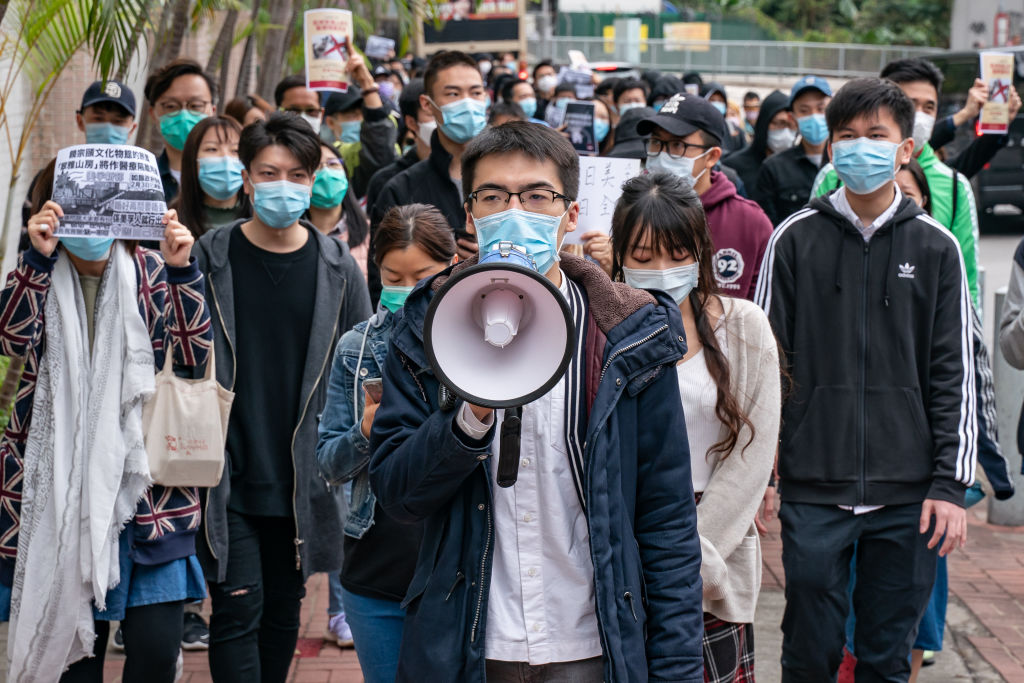
A number of people are also reporting that their WeChat moments (the Chinese equivalent of Facebook feed) were flooded with Dr Li-related posts and some were even referring this to the Wuchang Uprising – the armed rebellion against the Qing Dynasty that also happened to take place in Wuhan. Collective anger is extremely rare on Chinese social media.
As more posts are being censored across social media, a growing number of people have started to think about how to capitalize on the anger towards the clampdown on free speech.
“Tomorrow, when you wake up, I implore you not to forget what happened last night,” one Weibo user said. “We as a nation tend to forget things like this, but for our future, please never ever forget this one.”
It’s not just Beijing, Shanghai, China’s financial hub, and many other cities in the world’s most populous nation have turned into ghost towns after the government extended a holiday and asked residents not to go out because of the coronavirus.
“We know the situation of the coronavirus is severe. But the epicenter is far away, so we think it should be fine here … It’s a God-given chance to enjoy this family moment with snow and without work,” said MrQiao, who has an 11-year-old daughter.
Only a few people are brave enough to come out. A security guard at Jingshan Park said there were less than a third of the number of tourists than usual, even with the rare snowfall.
Even at one of the best spots for snapping photos of snowy Beijing just outside the Forbidden City, there’s barely a crowd, while the usual tour buses and groups of people speaking different dialects are nowhere to be seen.
Even on monday streets and subway are empty. Most offices are closed in Beijing. #coronavirus #beijing pic.twitter.com/eHW0Y6JmVk
— AJ (@ABruxellenses) February 10, 2020
Security guards along WangfujingStreet, a popular pedestrianized shopping area in downtown Beijing, said it was normally so crowded during the holiday period that it was hard to move around.
Businesses, including shops, bars, and restaurants, have been severely hit by the epidemic as the government has banned mass gatherings and even group meals in an effort to curb the spread of the coronavirus.
“You would have to wait outside for a table on a normal day,” said a waitress at a restaurant with more than 50 tables. Just five were taken at the peak lunch hour.
Only a handful of the more than 100 restaurants along Beijing’s famous food street, Guijie, were open, and the remaining outlets were wondering how long they can hold out.
(With inputs from Agencies)


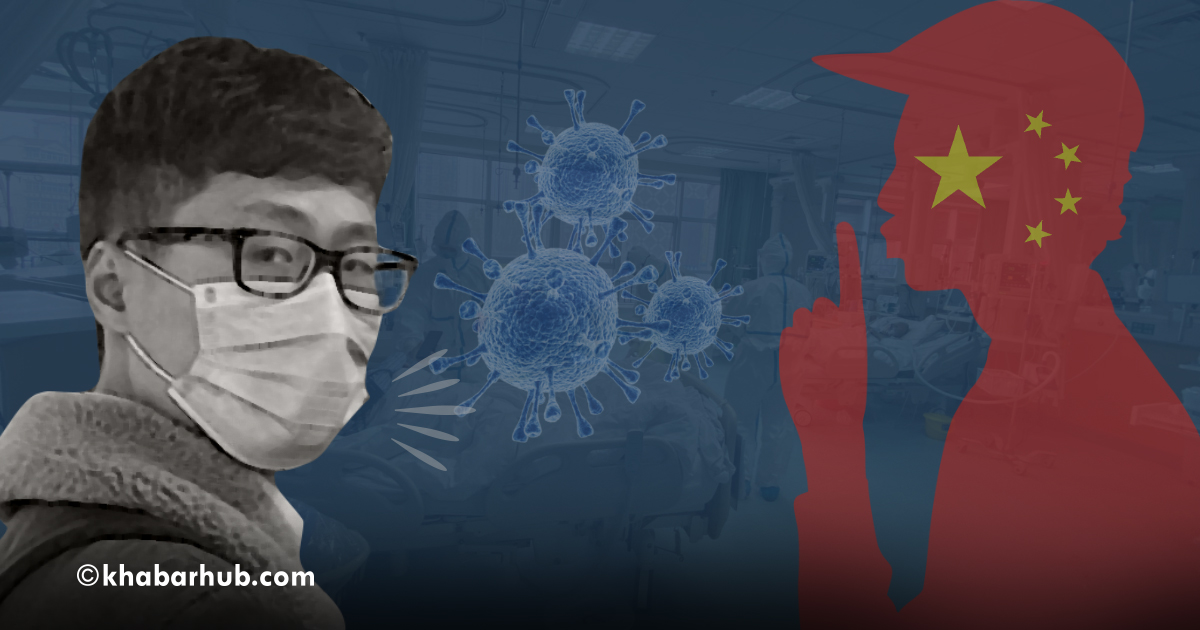
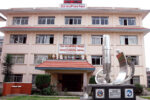
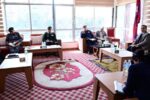
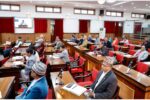
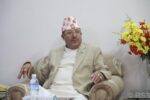


Comment